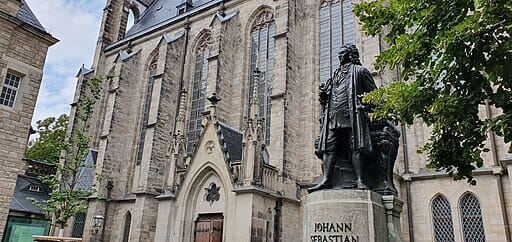Hi, this is Pastor Luther, and I’m in Leipzig, Germany, at a very important church. It’s called St Thomas Church. It’s important to the Reformation because it is here that Martin Luther came for a debate two years after he had published the 95 Theses. The debate was between Luther and a man by the name of Johannes Eck, and they came here to debate the big issues of the time. Luther, of course, denied the infallibility of the Pope. Eck argued in favor of the Pope. The issue between the two always was this, “What is the basis of our authority?” You and I must recognize that as a result of this debate, it only inflamed the Reformation, which had only begun.
By the way, here in Leipzig, Luther’s books were burned. So when they came here, they had security. There was a great deal of difficulty, oftentimes, with people who wanted to intervene, even with violence. It is also here where Luther learned that he was a Hussite. Now, up until then, he had denied it, but someone found the writings of John Hus, brought them to Luther, Luther read them, and said, “I am a Hussite.” That really meant that Luther was crossing the Rubicon. Huss had been put to death 100 years earlier for heresy. He was burned at the stake at Constance, and now Luther believed that he would experience the very same fate.
Now, they debated issues of indulgences, issues regarding purgatory, and you can read about all the details. But here’s the important point, the issue always came back to Scripture. Namely, what is your basis of authority? Is it human tradition, or is it the Scripture? And this debate actually helped Luther to clarify his own views, because he was going to stress “Sola Scriptura” (the Bible alone is the Word of God).
So right here in Leipzig, you had a debate which has implications for history. Now, behind me, there is, of course, the pulpit, but also the grave of Johann Sebastian Bach. Bach was “The Music Man” 200 years after the Reformation. All of us know how powerful his music has been all throughout the centuries. And he believed that when he wrote music, it was really a mirror of the Trinity, with its unity, with its harmony.
But behind me also, there are pictures of pastors. Every year when a pastor dies, they put up a picture of that pastor. I was here four or five years ago, and at that time, there was an empty space. That space is filled today. It’s a reminder to me, certainly, that all of us are transient. We are not meant for this world, and at some point, all of us are going to have our picture up, especially if it’s in the line of people who have died. It’s very sobering to me, because in my old age, I’m beginning to think of what legacy I’m leaving behind right here in Leipzig, Germany.
Thank you so much for joining us. God bless you. You
Related
Sorry, no records were found. Please adjust your search criteria and try again.
Sorry, unable to load the Maps API.
